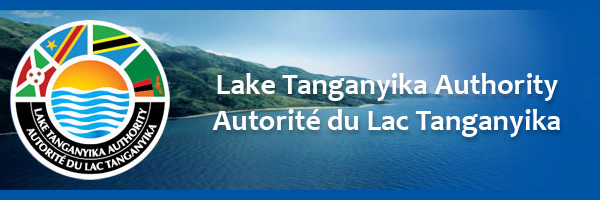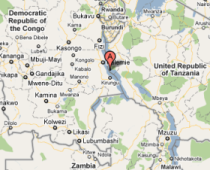Celebration of Lake Tanganyika National Day, 2012 edition
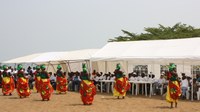 "If we do not take care, many human activities pose a threat to Lake Tanganyika," noted Mr. Gabriel Toyi, representing the second Vice-President of the Republic of Burundi, in the ceremonies of Lake Tanganyika National Day, July 22nd each year.
"If we do not take care, many human activities pose a threat to Lake Tanganyika," noted Mr. Gabriel Toyi, representing the second Vice-President of the Republic of Burundi, in the ceremonies of Lake Tanganyika National Day, July 22nd each year. 
For him, if nothing is done in terms of protection, Lake Tanganyika can become an unusable pond. He called on all Burundians to act for the protection of this important aquatic ecosystem. Mr. Toyi also mentioned that the Burundi Government is committed to protecting the lake by promulgating the Water Code and the National Strategy for Sustainable Tourism Development in Burundi. He recalled that people should avoid throwing waste of any kind in this lake, which, after all, is not a public dumping ground, and instead, promote rational fisheries.
 Dr. Henry Mwima, the Executive Director of Lake Tanganyika Authority (LTA) has recognized the efforts made by Burundi in protecting the lake and appealed to other Lake Tanganyika riparian countries (DRC, Tanzania and Zambia) to emulate the example set by the Government of the Republic of Burundi by setting aside one day to celebrate the unique and shared heritage: Lake Tanganyika. Mr. Mwima however informed that the problems to be solved for the protection of this lake include climate change, invasive species, sedimentation, overexploitation of natural resources, habitat destruction and pollution.
Dr. Henry Mwima, the Executive Director of Lake Tanganyika Authority (LTA) has recognized the efforts made by Burundi in protecting the lake and appealed to other Lake Tanganyika riparian countries (DRC, Tanzania and Zambia) to emulate the example set by the Government of the Republic of Burundi by setting aside one day to celebrate the unique and shared heritage: Lake Tanganyika. Mr. Mwima however informed that the problems to be solved for the protection of this lake include climate change, invasive species, sedimentation, overexploitation of natural resources, habitat destruction and pollution.
In addition, Mr. Albert Mbonerane, the Legal Representative of ACVE (Green Belt Action for Environment), noted that Burundi was the first Lake Tanganyika riparian country to ratify in 2004, the Convention on Sustainable Management of Lake Tanganyika and to organise in 2005, the celebration of the national day dedicated to this lake. He took this opportunity to recommend a better implementation of the Water Code by users and investors in the sector of water.
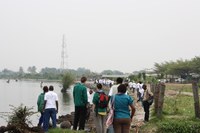 However, it was noted that the shoreline of Lake Tanganyika is seriously threatened by pollution from riparian cities, particularly in Bujumbura, at the place called "Ku mase". During a visit along the Lake Tanganyika shore, held on Friday 20th July, people were forced to hold their noses to avoid unpleasant odours caused by domestic wastewater flowing to the lake, and blackening the water and the silver sand on the beach.
However, it was noted that the shoreline of Lake Tanganyika is seriously threatened by pollution from riparian cities, particularly in Bujumbura, at the place called "Ku mase". During a visit along the Lake Tanganyika shore, held on Friday 20th July, people were forced to hold their noses to avoid unpleasant odours caused by domestic wastewater flowing to the lake, and blackening the water and the silver sand on the beach.
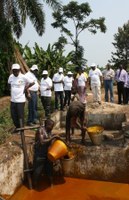 Participants to this visit organised as part of the celebration of the day, also remarked that in some places along the lake, as in Gitaza, Bujumbura Rural province (in the west) and Magara, in Bururi province (in southwest), uncontrolled constructions threaten the protection zone of 150 meters from the lake as stated in the Water Code and some palm oil processing units visited in Rumonge, Bururi province, do not pre-treat their liquid waste before discharging them into the lake. However, some hotels located near the lake as "Blue Bay" in Rumonge, took into account the environmental aspect and comply with the standards in relation to beach management. For this, many tourists are coming to rest on the picturesque beach and enjoy swimming in the clean waters of Lake Tanganyika.
Participants to this visit organised as part of the celebration of the day, also remarked that in some places along the lake, as in Gitaza, Bujumbura Rural province (in the west) and Magara, in Bururi province (in southwest), uncontrolled constructions threaten the protection zone of 150 meters from the lake as stated in the Water Code and some palm oil processing units visited in Rumonge, Bururi province, do not pre-treat their liquid waste before discharging them into the lake. However, some hotels located near the lake as "Blue Bay" in Rumonge, took into account the environmental aspect and comply with the standards in relation to beach management. For this, many tourists are coming to rest on the picturesque beach and enjoy swimming in the clean waters of Lake Tanganyika.
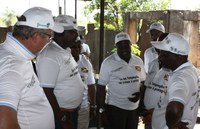 The Minister of Water, Environment, Land and Urban Planning, Mr. Jean Marie Nibirantije took this opportunity to mention that Burundi Government has implemented strategies to protect the lake through the Water Code. He indicated that severe penalties are provided for polluters, and that the water code requires observing a protection area of 150 meters from the shore, the destruction of illegally implemented building in this area, and the environmental impact assessment prior to implementing any project near the lake.
The Minister of Water, Environment, Land and Urban Planning, Mr. Jean Marie Nibirantije took this opportunity to mention that Burundi Government has implemented strategies to protect the lake through the Water Code. He indicated that severe penalties are provided for polluters, and that the water code requires observing a protection area of 150 meters from the shore, the destruction of illegally implemented building in this area, and the environmental impact assessment prior to implementing any project near the lake.
Mr. Gabriel Hakizimana, LTA Director of Environment, as he is concerned, stressed that pollution of the lake, considered as a freshwater reserve with a volume of 19,000 km³, is mainly caused by wastewater from the lake riparian cities, including Bujumbura. However, he moderated, analysis of waters in this lake of 32,900 km², conducted by the NGO "GIZ" confirm that the bacteriological quality of water from Lake Tanganyika is not proper for human consumption but, however, the chemical aspect of this water is not worrisome.
It is worth to mention that the celebration of this day was marked by cleaning the beach near Bujumbura Port, the destruction of illegal fishing gears and giving awards to students who had presented the best poems and best sketches about the theme: "Lake Tanganyika is a treasure to protect".

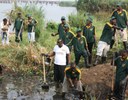



Document Actions
